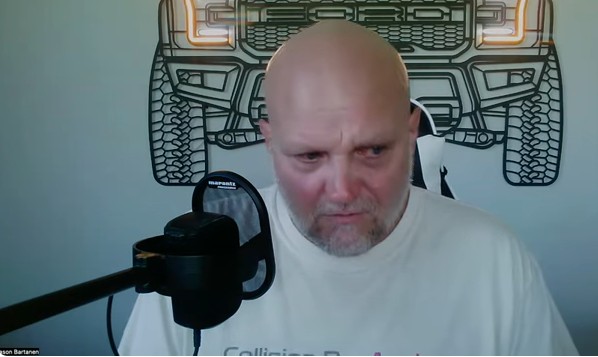The emotional pain one carries when they lose a friend to suicide was undeniably present during the latest episode of “In the Bay” podcast.
Jason Bartanen rolled through a plea for the collision industry to address mental illness as he rawly processed the death of a friend to suicide in a video uploaded Thursday.
“Earlier this week, I lost my third friend since 2021 to suicide,” Bartanen said.
Then he inhales. He pauses. He looks away from the camera and down.
He opened his mouth to talk several times, but words didn’t come out. He closed his mouth, gave a shake of the head as his eyes glossed over with tears.
“I didn’t know any of them were struggling,” he said as he regained enough composure to speak again. “I didn’t know any of them needed some help. I wish I would have. I wish I would have known. I wish they would have known how much I care about them and how much their friends and family do, and I wish they would have talked to somebody.”
He asked that anyone struggling with mental illness talk to somebody. He suggested a pastor, rabbi, friends, family, or call the 988 Suicide & Crisis Lifeline.
“Technicians are not unlike anybody else in society,” Bartanen says. “We’ve got challenges at work. We’ve got challenges at home. We have stress. Sometimes we just don’t know how to deal with them. It’s OK to not be OK.”
Bartanen tearfully pleads with viewers to seek help if they need it. He reminds them they are not alone and that they matter.
“We can do this together,” he says.
Every person on the planet has been impacted by some sort of mental health challenge either directly or indirectly, he said.
“It is a part of our lives, unfortunately,” he said.
Our culture will seek medical treatment for a broken bone or a sprained ankle, he added.
Bartanen then asks, “When our mental health is giving us issues and challenges and putting up hurdles, why wouldn’t we talk to somebody?”
He also asks that viewers help others.
“Those friends you’ve been meaning to give a call, send them a text — do it,” Bartanen says.
He says if you’ve been meaning to get together to watch a game, play golf, or take a vacation, “Do it, it will be good for you,” he says.
Mental health highlighted during CIC
Andy Tylka, creator of “Brake the Stigma,” told audience members of the Society of Collision Repair Specialists (SCRS) meeting in May that 1 in 5 automotive professionals experience a mental health condition. He said suicide rates in the industry are among the highest, and 80% of workers say mental health support would improve their performance.
Yet, only 50% of employees feel comfortable discussing their mental health, he said.
Brake the Stigma helps raise awareness in the industry, along with connecting those in the industry to resources, hotlines, and mental health services.
It also offers tools to employers to help them foster a mentally healthy workplace and advocates for change that prioritizes mental health in the workplace.
Ben Chesterfield, general manager of Car Craft Accident Repair Centres in Queensland, Australia, also spoke at CIC’s spring meeting about a shirt the Motor Trades Association of Queensland created to start conversations about mental illness in the collision industry.
Fifty percent of the funding from the shirt sales supports mental health for trade workers, he said.
The shirt has wheels, tires, and roads, and on the back says, “Don’t shut the bonnet on it.”
Bonnet is an Australian word for a vehicle hood.
“It doesn’t matter what you do at work every day,” Chesterfield said. “It doesn’t matter if it’s tires, whether it’s mechanical service work, whatever, you always shut the bonnet. But the message we’re trying to get out is, don’t shut the bonnet on mental health. Don’t shut the bonnet on whatever’s going on in your life.”
Shirts can be purchased through the Motor Trades Association in Queensland here.
Anyone seeking immediate help in the U.S. can call or text 988. Those seeking help can also chat with someone at 988lifeline.org.
IMAGE
Screenshot from “In the Bay” podcast.
Share This:
Related

